外研版八年级英语上册课件 Module 7 Unit 2 (2)(共43张PPT,无音频)
文档属性
| 名称 | 外研版八年级英语上册课件 Module 7 Unit 2 (2)(共43张PPT,无音频) | 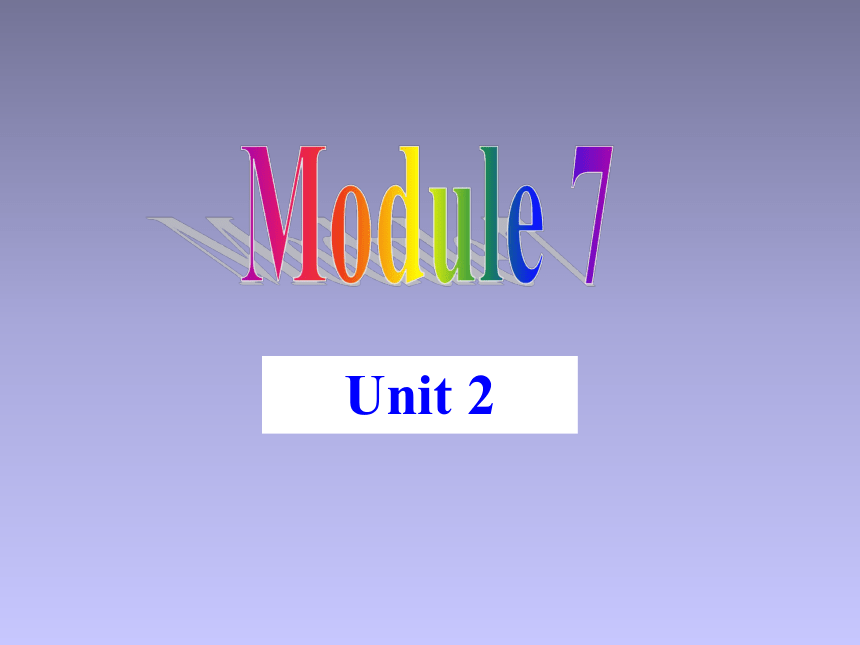 | |
| 格式 | ppt | ||
| 文件大小 | 3.3MB | ||
| 资源类型 | 教案 | ||
| 版本资源 | 外研版 | ||
| 科目 | 英语 | ||
| 更新时间 | 2022-08-01 08:20:28 | ||
图片预览

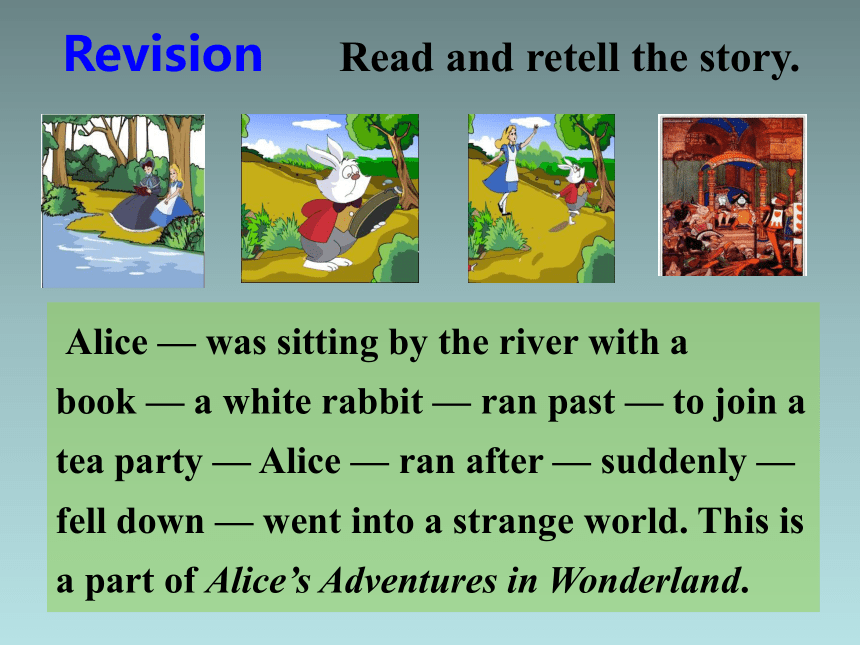
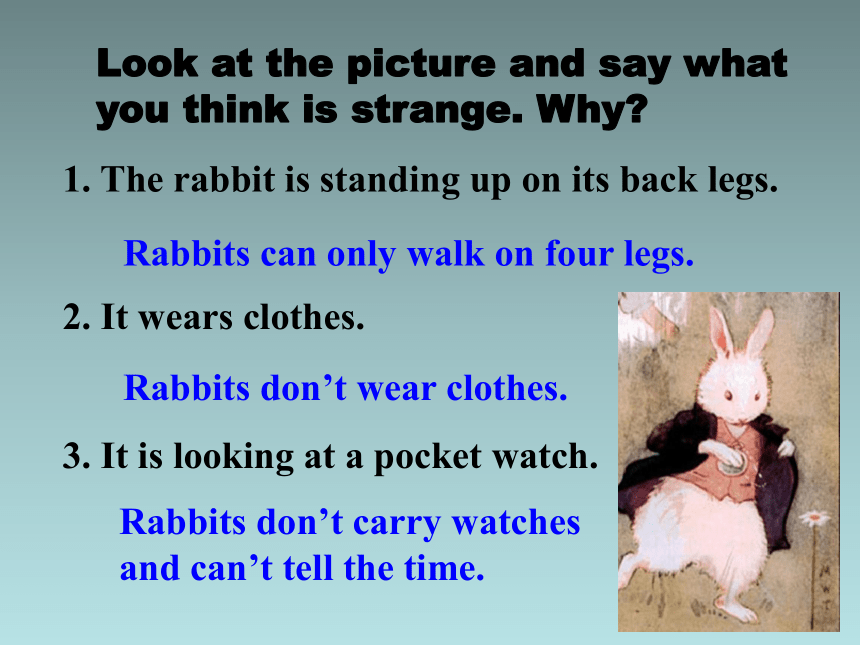
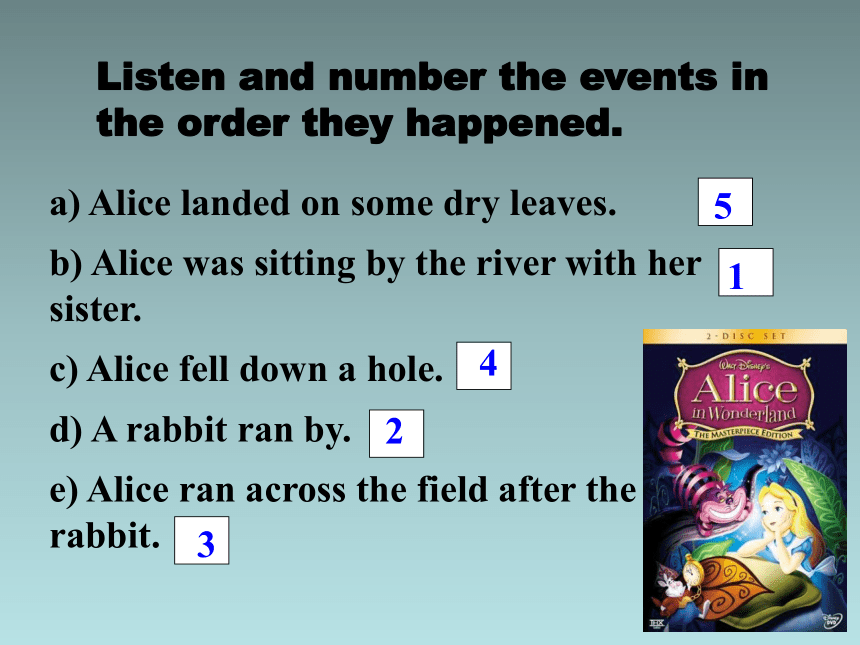
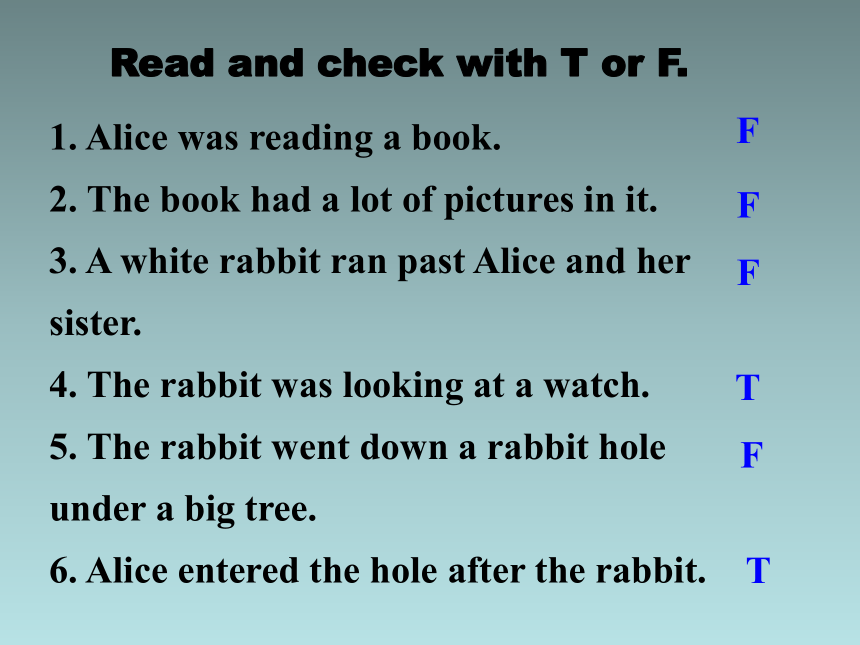
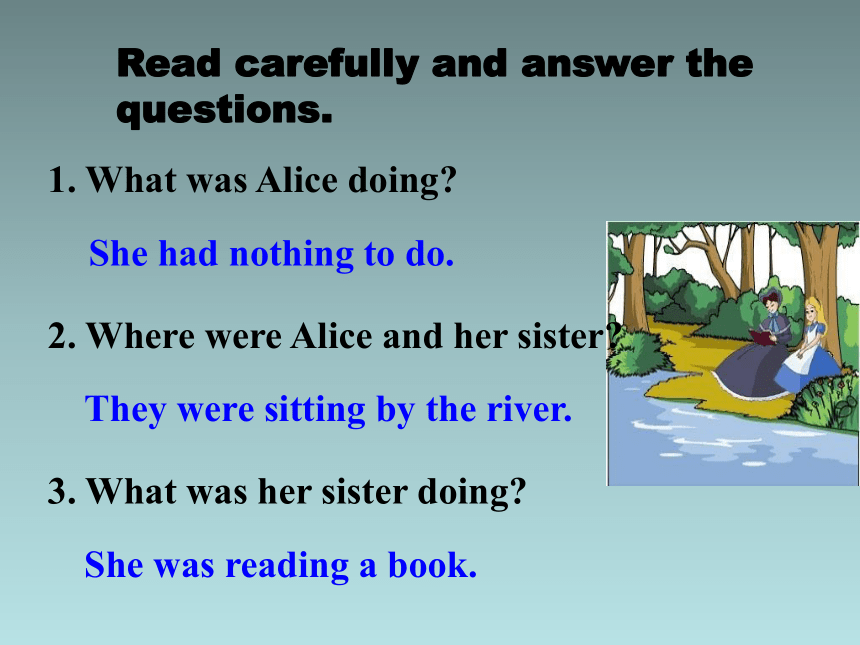
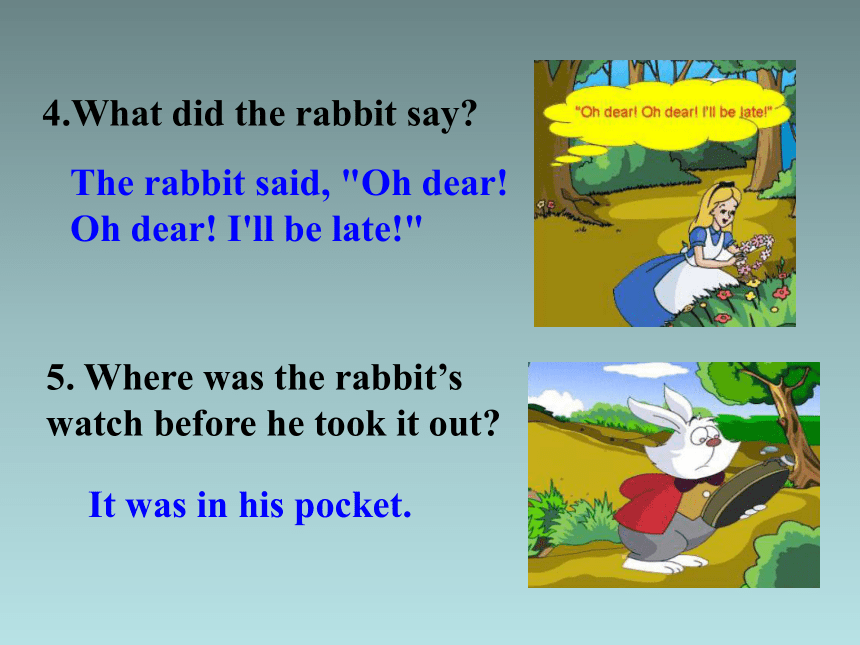

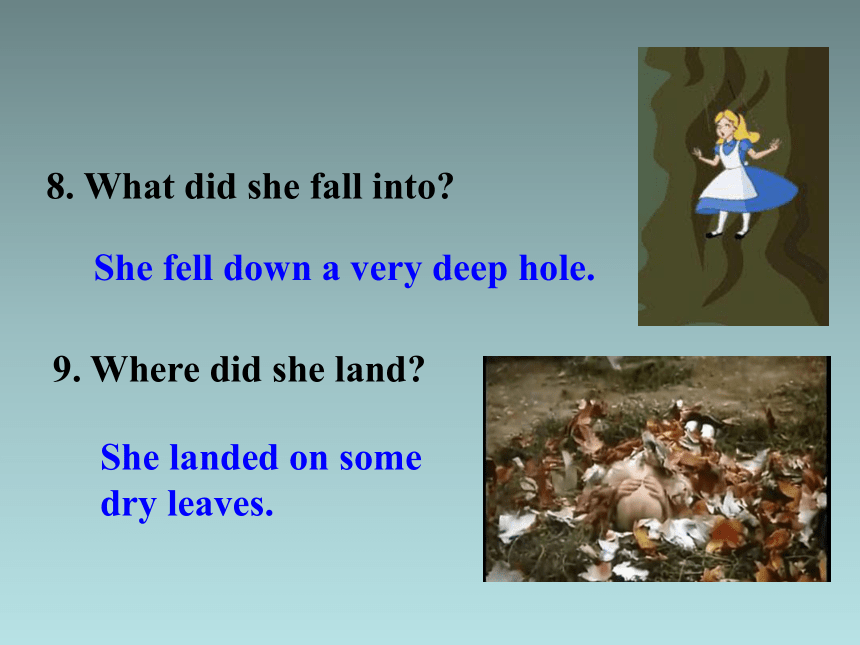
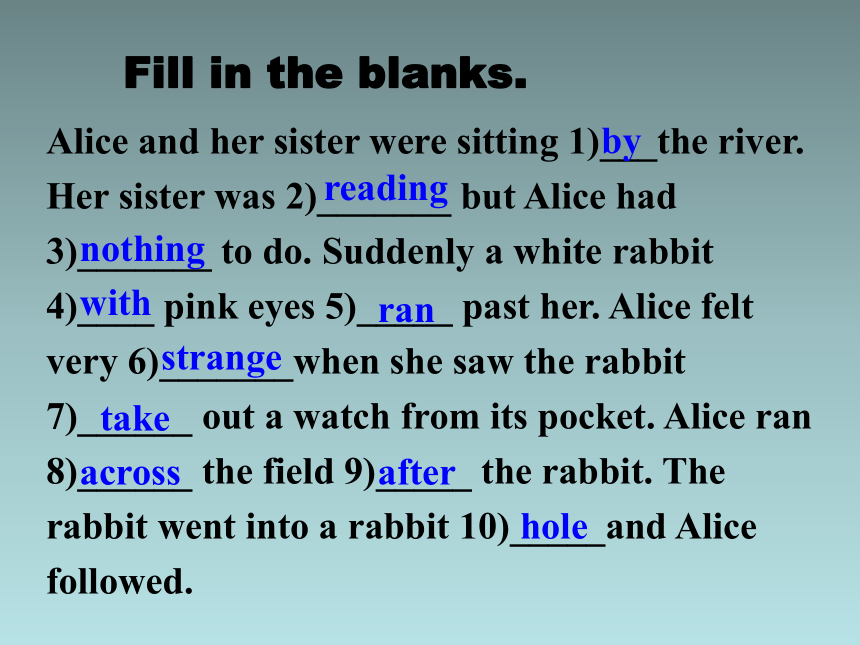
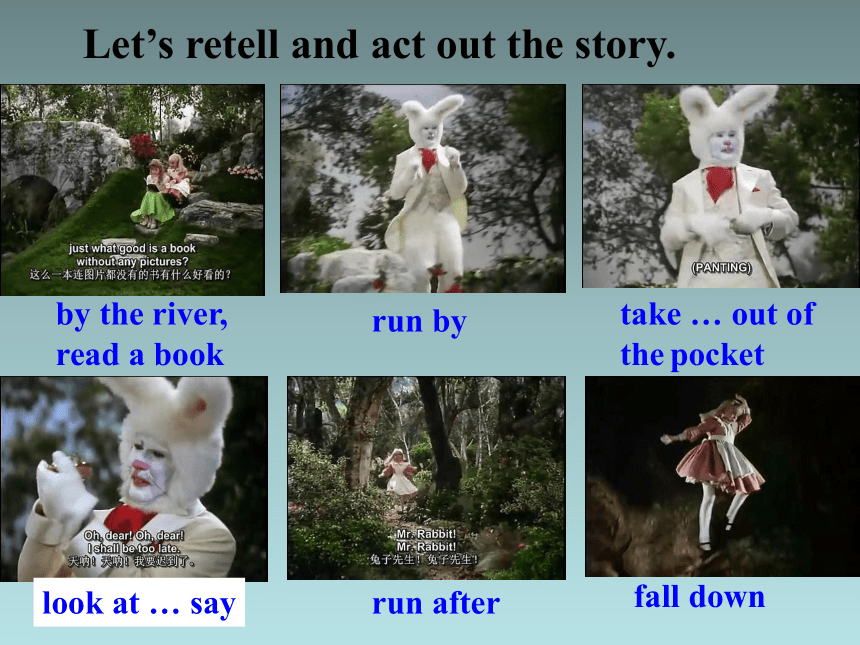
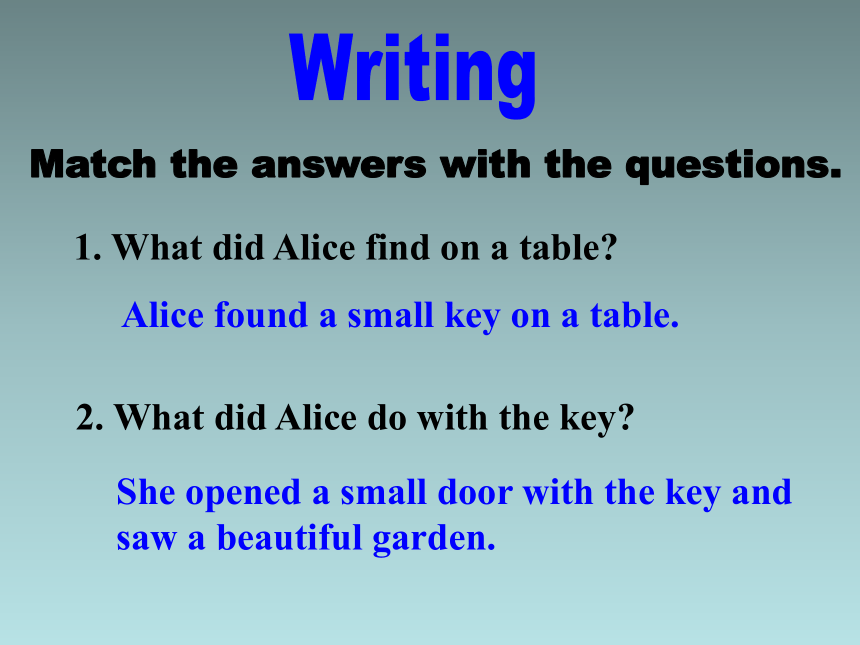
文档简介
(共43张PPT)
Unit 2
Revision Read and retell the story.
Alice — was sitting by the river with a book — a white rabbit — ran past — to join a tea party — Alice — ran after — suddenly — fell down — went into a strange world. This is a part of Alice’s Adventures in Wonderland.
1. The rabbit is standing up on its back legs.
2. It wears clothes.
Look at the picture and say what you think is strange. Why
Rabbits can only walk on four legs.
Rabbits don’t wear clothes.
3. It is looking at a pocket watch.
Rabbits don’t carry watches and can’t tell the time.
Listen and number the events in the order they happened.
Alice landed on some dry leaves.
Alice was sitting by the river with her sister.
Alice fell down a hole.
A rabbit ran by.
Alice ran across the field after the rabbit.
5
1
4
2
3
Read and check with T or F.
1. Alice was reading a book.
2. The book had a lot of pictures in it.
3. A white rabbit ran past Alice and her sister.
4. The rabbit was looking at a watch.
5. The rabbit went down a rabbit hole under a big tree.
6. Alice entered the hole after the rabbit.
F
F
F
T
F
T
1. What was Alice doing
2. Where were Alice and her sister
3. What was her sister doing
She had nothing to do.
They were sitting by the river.
She was reading a book.
Read carefully and answer the questions.
4.What did the rabbit say
The rabbit said, "Oh dear! Oh dear! I'll be late!"
5. Where was the rabbit’s watch before he took it out
It was in his pocket.
6. What did Alice run across after the rabbit
7.Where did the rabbit go
He went across a field and down a large rabbit hole in the ground.
She ran across a field.
8. What did she fall into
9. Where did she land
She fell down a very deep hole.
She landed on some dry leaves.
Fill in the blanks.
Alice and her sister were sitting 1)___the river. Her sister was 2)_______ but Alice had 3)_______ to do. Suddenly a white rabbit 4)____ pink eyes 5)_____ past her. Alice felt very 6)_______when she saw the rabbit 7)______ out a watch from its pocket. Alice ran 8)______ the field 9)_____ the rabbit. The rabbit went into a rabbit 10)_____and Alice followed.
by
reading
nothing
with
ran
strange
take
across
after
hole
Let’s retell and act out the story.
by the river,
read a book
run by
take … out of
the pocket
look at … say
run after
fall down
Match the answers with the questions.
1. What did Alice find on a table
2. What did Alice do with the key
Alice found a small key on a table.
She opened a small door with the key and saw a beautiful garden.
3. What did Alice find next
4. What happened to Alice when she drank from the bottle
She found a bottle with the words “DRINK ME” on it.
She became very small.
After Alice found a small key on a table, she opened a small door ...
Imagine what will happen next.
Tips: 1. You can use the answers in Activity 5.
2.You can add some words to show the sequence, like “after, next, then, finally, etc ”.
In the hole, Alice saw many strange things. First, she saw some strange animals.
Let’s go on with Lewis’ story.
They were singing and dancing noisily.
Next , she met the Mad Hatter and the March hare.
They were having a tea
party.
Then, she met the Cheshire Cat.
It was sitting in the tree and smiling at everyone.
Finally, Alice met the Red King and the Red Queen.
They were having a trial (审判).
In the end, Alice woke up. Luckily, it was just a dream.
1. Once or twice …
once or twice 偶尔,一两次
I've only been there once or twice.
我只是偶尔到过那里。
He visits Paris once or twice a month.
他一个月去一两次巴黎。
2. And what is a book for, …
What … for 为什么…; 干什么
本意是表示某物是干什么用的,也可以用来询问对方为什么要干某事,相当于“why”。如:
What is it for
这是干什么用的?
What did you say that for
你为什么要那样说?
What do you need so much money for
你要这么多钱干什么?
3. … took a watch out of its pocket
take … out of 从……拿出
Jane took some money out of her pocket.
珍妮从她的口袋里拿出一些钱。
You can't take the books out of the library.
你们不能把书带出图书馆。
[链接]
take out 取出,拿出
Don't forget to take out the litter.
别忘了把垃圾拿出去。
Please take out your pencil-box.
请拿出你的铅笔盒。
— Lisa, we need to clean the kitchen.
Could you _______ the trash
— Yes, sure. (2009临沂中考)
A. take after B. take off
C. take place D. take out
D
take out
Your pen is in my pencil case. You can _______ it _______. (拿出,取出)
【2012山东济宁】23. — Ted, Could you please ________ the trash
— Of course, Mom.
A. take after B. take off
C. take out D. take care of
【答案】C
【解析】考查动词短语。take out the trash 意为“取出垃圾”。
C
take off 脱下; (飞机)起飞
take back 收回; 撤销
take away 拿走
take down 记录
有关take的短语:
4. … ran across the field
It's dangerous to run across the busy road.
跑着穿越繁忙的马路是很危险的。
Please tell the children to walk calmly across the road, not run across.
请告诉孩子们过马路时要镇静,不要跑着横穿马路。
run across 奔跑着穿过马路等
go / walk across 穿过,越过,横穿
[链接]
run across 偶然遇见(不期而遇)
I ran across an old friend in the street.
我在街上偶遇了一位老朋友。
I ran across Tom on my way to school.
在去学校的路上我碰到了汤姆。
[辨析] across, cross, through 和 over 的区别
across是介词,强调从一定范围的一边到另一边,且在物体表面上或沿着某一条线的方向而进行的动作,其含义常与介词on有关,常和表示“走”一类的动词(如:walk,run,fly,jump等)连用。
Go across the bridge, and you’ll find the park.
越过这座桥,你就会找到公园。
The little girl ran across the road.
这个小女孩横穿马路。
The old man is crossing the road.
这位老人正在穿过马路。
Be careful when you cross the street.
过街时你要小心。
cross是动词,表示“穿过、越过、渡过”。
through是介词,表示从某一范围的一端到另一端,但它表示的动作是在内部空间进行的,往往指穿过沙漠、森林、窗户等。
The river runs through the city.
这条河从这座城市中间流过。
Can you see it through this hole
你能透过这个洞看到它吗?
over是介词,用作“穿过、通过”时,表示到达高的障碍物(如树、墙、篱笆和山脉等)的另一侧。
He jumped over the wall.
他跳过了墙。
The horse jumped over the fence.
马跳过栅栏。
注意:
如果不强调动作,只说明处于墙、篱笆或山等障碍物的另一侧时,over和across也可互换。
If we can be over / across the mountain before 8 o’clock, we can be helped.
如果我们八点前能到达山那边,我们就能获救。
1. We must ________ the road very carefully.
2. Before going _________ the road, you should look left first and then right.
3. Look! The man is swimming _______ the lake.
4. He climbed ______ the wall.
Fill in the blanks using across, cross, through and over.
Practice
across
cross
across
over
5. ________ the street and you can get to the hotel.
6. He _________ the road and then comes to the post office.
7. Go _________ the bridge and you will see the station.
8. We walked _________ the forest.
9. Can the table go ________ the door
10. He drove ____________ the bridge.
through
across
Cross
crosses
through
over / across
(2011 山东烟台) — Can a plane fly _____ the Atlantic Ocean
— Yes, but it needs to go ______ the clouds for hours.
A. across, through B. through, across
C. across, across D. through, through
答案:A
【2012江苏泰州】2. The moonlight is shining in _______ the window. Everything in the room looks so nice.
A. over B. across
C. through D. past
【答案】C
【解析】选C。考查介词的用法。句意为“月光从窗户透进来”,从B、C之间选。through意为“从内部通过”。故选C。
5. ... but never thought about how she was going to ...
think about = think of 考虑……
Don’t think about / of me any more.
不要再考虑我了。
They’re thinking about / of buying a new car.
他们正在考虑买一辆新车。
think of 想起……
He can’t think of his son.
他想不起来他儿子了。
6. While she was falling …
While I was watching TV, the bell rang.
我看电视时,铃响了。
Tom watched TV while she ate her supper.
汤姆边吃晚饭边看电视。
We must strike while the iron is hot.
趁热打铁。
while conj. 当……的时候(引导时间状语从句)
[辨析] while和when用法区别
when表示“当……的时候”, 从句中既可以用延续性动词, 表示状态或时间段, 也可以用非延续性动词, 表示动作或时间点;
while表示“当…… 的时候”、“在……期间”, 从句中只能用延续性动词, 表示状态或时间段。如:
It was snowing when we arrived at the station.
When he came in, we all stood up, smiling.
I was very fat when / while I was a child.
When / While she was reading, someone knocked at the door.
在when或while所引导的状语从句中, 如果从句的主语和主句的主语相同, 且动词又是be动词时, 从句的主语和be动词往往可以省略。如:
When / While (I was) walking along the street, I heard my name called.
When / While (you’re) in trouble, turn to me for help.
1._______we left the house, he was still sitting in the garden.
2. I had my finger cut ____________ cooking in the kitchen yesterday.
3. We were boating on the lake _____ suddenly someone cried for help.
4. _______ she was listening to the radio, she fell asleep.
when
When
when / while
While
Exercise
1. 在我们决定离开学校之前,我们应该考虑一下我们的未来。
We should ______ ______ our future before we decide to leave school.
2. 这只猴子从袋子里取出一个苹果就开始吃。
The monkey ______ an apple ______ _______ the bag and began to eat.
Complete the sentences.
think of / about
took
out of
3.有一两次我以为灯会灭了。
_____ _____ ______ I thought the light would go out.
4.他穿过公园,走过一道大门。
He walked _______ the park and through a gateway.
Once or twice
across
Unit 2
Revision Read and retell the story.
Alice — was sitting by the river with a book — a white rabbit — ran past — to join a tea party — Alice — ran after — suddenly — fell down — went into a strange world. This is a part of Alice’s Adventures in Wonderland.
1. The rabbit is standing up on its back legs.
2. It wears clothes.
Look at the picture and say what you think is strange. Why
Rabbits can only walk on four legs.
Rabbits don’t wear clothes.
3. It is looking at a pocket watch.
Rabbits don’t carry watches and can’t tell the time.
Listen and number the events in the order they happened.
Alice landed on some dry leaves.
Alice was sitting by the river with her sister.
Alice fell down a hole.
A rabbit ran by.
Alice ran across the field after the rabbit.
5
1
4
2
3
Read and check with T or F.
1. Alice was reading a book.
2. The book had a lot of pictures in it.
3. A white rabbit ran past Alice and her sister.
4. The rabbit was looking at a watch.
5. The rabbit went down a rabbit hole under a big tree.
6. Alice entered the hole after the rabbit.
F
F
F
T
F
T
1. What was Alice doing
2. Where were Alice and her sister
3. What was her sister doing
She had nothing to do.
They were sitting by the river.
She was reading a book.
Read carefully and answer the questions.
4.What did the rabbit say
The rabbit said, "Oh dear! Oh dear! I'll be late!"
5. Where was the rabbit’s watch before he took it out
It was in his pocket.
6. What did Alice run across after the rabbit
7.Where did the rabbit go
He went across a field and down a large rabbit hole in the ground.
She ran across a field.
8. What did she fall into
9. Where did she land
She fell down a very deep hole.
She landed on some dry leaves.
Fill in the blanks.
Alice and her sister were sitting 1)___the river. Her sister was 2)_______ but Alice had 3)_______ to do. Suddenly a white rabbit 4)____ pink eyes 5)_____ past her. Alice felt very 6)_______when she saw the rabbit 7)______ out a watch from its pocket. Alice ran 8)______ the field 9)_____ the rabbit. The rabbit went into a rabbit 10)_____and Alice followed.
by
reading
nothing
with
ran
strange
take
across
after
hole
Let’s retell and act out the story.
by the river,
read a book
run by
take … out of
the pocket
look at … say
run after
fall down
Match the answers with the questions.
1. What did Alice find on a table
2. What did Alice do with the key
Alice found a small key on a table.
She opened a small door with the key and saw a beautiful garden.
3. What did Alice find next
4. What happened to Alice when she drank from the bottle
She found a bottle with the words “DRINK ME” on it.
She became very small.
After Alice found a small key on a table, she opened a small door ...
Imagine what will happen next.
Tips: 1. You can use the answers in Activity 5.
2.You can add some words to show the sequence, like “after, next, then, finally, etc ”.
In the hole, Alice saw many strange things. First, she saw some strange animals.
Let’s go on with Lewis’ story.
They were singing and dancing noisily.
Next , she met the Mad Hatter and the March hare.
They were having a tea
party.
Then, she met the Cheshire Cat.
It was sitting in the tree and smiling at everyone.
Finally, Alice met the Red King and the Red Queen.
They were having a trial (审判).
In the end, Alice woke up. Luckily, it was just a dream.
1. Once or twice …
once or twice 偶尔,一两次
I've only been there once or twice.
我只是偶尔到过那里。
He visits Paris once or twice a month.
他一个月去一两次巴黎。
2. And what is a book for, …
What … for 为什么…; 干什么
本意是表示某物是干什么用的,也可以用来询问对方为什么要干某事,相当于“why”。如:
What is it for
这是干什么用的?
What did you say that for
你为什么要那样说?
What do you need so much money for
你要这么多钱干什么?
3. … took a watch out of its pocket
take … out of 从……拿出
Jane took some money out of her pocket.
珍妮从她的口袋里拿出一些钱。
You can't take the books out of the library.
你们不能把书带出图书馆。
[链接]
take out 取出,拿出
Don't forget to take out the litter.
别忘了把垃圾拿出去。
Please take out your pencil-box.
请拿出你的铅笔盒。
— Lisa, we need to clean the kitchen.
Could you _______ the trash
— Yes, sure. (2009临沂中考)
A. take after B. take off
C. take place D. take out
D
take out
Your pen is in my pencil case. You can _______ it _______. (拿出,取出)
【2012山东济宁】23. — Ted, Could you please ________ the trash
— Of course, Mom.
A. take after B. take off
C. take out D. take care of
【答案】C
【解析】考查动词短语。take out the trash 意为“取出垃圾”。
C
take off 脱下; (飞机)起飞
take back 收回; 撤销
take away 拿走
take down 记录
有关take的短语:
4. … ran across the field
It's dangerous to run across the busy road.
跑着穿越繁忙的马路是很危险的。
Please tell the children to walk calmly across the road, not run across.
请告诉孩子们过马路时要镇静,不要跑着横穿马路。
run across 奔跑着穿过马路等
go / walk across 穿过,越过,横穿
[链接]
run across 偶然遇见(不期而遇)
I ran across an old friend in the street.
我在街上偶遇了一位老朋友。
I ran across Tom on my way to school.
在去学校的路上我碰到了汤姆。
[辨析] across, cross, through 和 over 的区别
across是介词,强调从一定范围的一边到另一边,且在物体表面上或沿着某一条线的方向而进行的动作,其含义常与介词on有关,常和表示“走”一类的动词(如:walk,run,fly,jump等)连用。
Go across the bridge, and you’ll find the park.
越过这座桥,你就会找到公园。
The little girl ran across the road.
这个小女孩横穿马路。
The old man is crossing the road.
这位老人正在穿过马路。
Be careful when you cross the street.
过街时你要小心。
cross是动词,表示“穿过、越过、渡过”。
through是介词,表示从某一范围的一端到另一端,但它表示的动作是在内部空间进行的,往往指穿过沙漠、森林、窗户等。
The river runs through the city.
这条河从这座城市中间流过。
Can you see it through this hole
你能透过这个洞看到它吗?
over是介词,用作“穿过、通过”时,表示到达高的障碍物(如树、墙、篱笆和山脉等)的另一侧。
He jumped over the wall.
他跳过了墙。
The horse jumped over the fence.
马跳过栅栏。
注意:
如果不强调动作,只说明处于墙、篱笆或山等障碍物的另一侧时,over和across也可互换。
If we can be over / across the mountain before 8 o’clock, we can be helped.
如果我们八点前能到达山那边,我们就能获救。
1. We must ________ the road very carefully.
2. Before going _________ the road, you should look left first and then right.
3. Look! The man is swimming _______ the lake.
4. He climbed ______ the wall.
Fill in the blanks using across, cross, through and over.
Practice
across
cross
across
over
5. ________ the street and you can get to the hotel.
6. He _________ the road and then comes to the post office.
7. Go _________ the bridge and you will see the station.
8. We walked _________ the forest.
9. Can the table go ________ the door
10. He drove ____________ the bridge.
through
across
Cross
crosses
through
over / across
(2011 山东烟台) — Can a plane fly _____ the Atlantic Ocean
— Yes, but it needs to go ______ the clouds for hours.
A. across, through B. through, across
C. across, across D. through, through
答案:A
【2012江苏泰州】2. The moonlight is shining in _______ the window. Everything in the room looks so nice.
A. over B. across
C. through D. past
【答案】C
【解析】选C。考查介词的用法。句意为“月光从窗户透进来”,从B、C之间选。through意为“从内部通过”。故选C。
5. ... but never thought about how she was going to ...
think about = think of 考虑……
Don’t think about / of me any more.
不要再考虑我了。
They’re thinking about / of buying a new car.
他们正在考虑买一辆新车。
think of 想起……
He can’t think of his son.
他想不起来他儿子了。
6. While she was falling …
While I was watching TV, the bell rang.
我看电视时,铃响了。
Tom watched TV while she ate her supper.
汤姆边吃晚饭边看电视。
We must strike while the iron is hot.
趁热打铁。
while conj. 当……的时候(引导时间状语从句)
[辨析] while和when用法区别
when表示“当……的时候”, 从句中既可以用延续性动词, 表示状态或时间段, 也可以用非延续性动词, 表示动作或时间点;
while表示“当…… 的时候”、“在……期间”, 从句中只能用延续性动词, 表示状态或时间段。如:
It was snowing when we arrived at the station.
When he came in, we all stood up, smiling.
I was very fat when / while I was a child.
When / While she was reading, someone knocked at the door.
在when或while所引导的状语从句中, 如果从句的主语和主句的主语相同, 且动词又是be动词时, 从句的主语和be动词往往可以省略。如:
When / While (I was) walking along the street, I heard my name called.
When / While (you’re) in trouble, turn to me for help.
1._______we left the house, he was still sitting in the garden.
2. I had my finger cut ____________ cooking in the kitchen yesterday.
3. We were boating on the lake _____ suddenly someone cried for help.
4. _______ she was listening to the radio, she fell asleep.
when
When
when / while
While
Exercise
1. 在我们决定离开学校之前,我们应该考虑一下我们的未来。
We should ______ ______ our future before we decide to leave school.
2. 这只猴子从袋子里取出一个苹果就开始吃。
The monkey ______ an apple ______ _______ the bag and began to eat.
Complete the sentences.
think of / about
took
out of
3.有一两次我以为灯会灭了。
_____ _____ ______ I thought the light would go out.
4.他穿过公园,走过一道大门。
He walked _______ the park and through a gateway.
Once or twice
across
同课章节目录
- Module 1 How to learn English
- Unit 1 Let's try to speak English as much as possi
- Unit 2 You should smile at her.
- Unit 3 Language in use .
- Module 2 My home town and my country
- Unit 1 It's taller than many other buildings.
- Unit 2 Cambridge is a beautiful city in the east o
- Unit 3 Language in use .
- Module 3 Sports.
- Unit 1 Nothing is more exciting than playing tenni
- Unit 2 This year we training more carefully.
- Unit 3 Language in use .
- Module 4 Planes, ships and trains .
- Unit 1 He lives the farthest from school.
- Unit 2 What is the best way to travel.
- Unit 3 Language in use .
- Module 5 Lao She Teahouse.
- Unit 1 I wanted to see the Beijing Opera.
- Unit 2 It descibes the changes in Chinese society.
- Unit 3 Language in use .
- Module 6 Animals in danger.
- Unit 1 It allows people to get closer to them .
- Unit 2 The WWF is working hard to save them all.
- Unit 3 Language in use .
- Revision module A
- Module 7 A famous story
- Unit 1 Alice was sitting with her sister by the ri
- Unit 2 She was thinking about her cat.
- Unit 3 Language in use .
- Module 8 Accidents
- Unit 1 While the car were changing to red, a car s
- Unit 2 I was trying to pick it up when it bite me
- Unit 3 Language in use .
- Module 9 Population
- Unit 1 The population of China is about 1.37 billi
- Unit 2 Arnwick was a city with 200,000 people.
- Unit 3 Language in use .
- Module 10 The weathe
- Unit 1 It might snow.
- Unit 2 The weather is fine all year round.
- Unit 3 Language in use .
- Module 11 Way of life
- Unit 1 In China ,we open a gift later.
- Unit 2 In England, you usually drink tea with milk
- Unit 3 Language in use .
- Module 12 Help
- Unit 1 What should we do before help arrives?
- Unit 2 Stay away from windows and heavy furniture.
- Unit 3 Language in use .
- Revision module B
